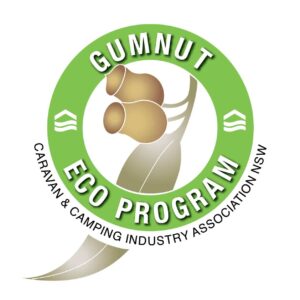Caravan & Camping Green Travel 101
There are many ways in which travellers can be “responsible tourists” without extra costs and most importantly, without extra effort – after all holidays are all about relaxing and fun aren’t they?
Purchase your caravan, camper van or trailer and camping supplies from a business with a Gumnut Award and ensure you book your accommodation at a Gumnut Award Holiday Park. Businesses with a Gumnut Award are supporting responsible tourism and taking steps to minimise their environmental footprint.
Before Leaving Home
- Turn off all appliances except fridges/freezers and any timers you are using before going away to save energy.
- Remove all unnecessary items from your vehicle, caravan, RV or camper trailer. Less weight means less fuel consumption.
- Ensure you don’t overload the van or trailer when packing, distribute weight correctly*.
- Install a good set of curtains (especially rubber backed) in your caravan or RV to assist in maintaining comfortable air temperatures inside.
- If you are going on an extended journey – switch over to online banking so you can pay bills and easily transfer money between accounts – you’ll save time and money in postage, paper and envelopes.
- Wash vehicles and vans on grassed areas and use biodegradable detergents with no or low phosphate content.
- Some holiday places are pet friendly and some are not – check first to avoid disappointment. If pets are permitted, make sure your pet is under control at all times. Do not take domestic pets into National Parks.
- Put a hold on your local newspaper delivery – not only is it a waste of paper, uncollected papers are a sure sign no-one’s home.
While On The Road
- Check air pressure in your tyres on your vehicle, van or trailer; incorrect air pressure will increase the fuel consumption. Don’t forget to check your nuts too.
- Avoid driving at dusk and dawn as much as possible as this is when wildlife are most active.
- Try to avoid using the air conditioner if driving under 80kms /hour. Instead, keep the windows down to avoid excessive fuel use. Over 80kms it’s better to have the windows up and air conditioner on to maintain aerodynamic performance.
- Share the driving and make sure you stop and break every two hours.
- Stay on designated tracks and roads to avoid causing erosion and spreading weeds.
- Always make sure closed gates are closed again after you drive through to avoid stock loss.
- When stopped for a break, check the wheel nuts are not warm – this is a sign of uneven tightening and should be corrected immediately.
Setting Up Camp
- Setup your tent, van or RV only in designated areas.
- Where possible, orientate the side of your caravan or RV with the awning to the north, especially in summer to maximise the cooling inside.
- Avoid being directly under trees even in the middle of summer as many Australian trees will drop branches unexpectedly; try a tarp over the top for extra shade instead.
- Don’t tie ropes around tree trunks or limbs as this can cause ringbarking that will cause the tree to become stressed and dangerous. Tent and tarp poles may be purchased from caravan, RV and camping equipment suppliers.
- If fires are allowed, only use existing fire pits and ensure your tent, van or RV is upwind and far enough away to avoid embers. Make sure the fire is out before going to bed or leaving the site.
When Camped
- Use only formaldehyde free chemicals in holding tanks and always dispose of waste in dump points.
- Do not throw rubbish (including nappies) into dump points or composting toilet facilities.
- Use biodegradable, phosphate free detergents (labelled NP) for washing dishes and always empty dirty water at least 30 metres away from natural waterways like creeks and rivers.
- It’s illegal to take anything from a National Park – including wood. Purchase wood from a local supplier or invest in a log maker and make your own combustible long burning logs from paper– cheap and easy to do.
- If using a heater or air conditioner, ensure all doors and windows are closed first.
- Shop locally and help support small businesses in the communities you are visiting.
- Take advantage of courtesy buses, or walk or ride where possible to local venues and attractions.
- Think before you purchase – avoid over-packaged items and choose those with containers that can be reused or recycled. Not all communities have full recycling facilities so it’s best to avoid unnecessary waste.
- Don’t feed wildlife as they can become seriously ill from human food.
- Try citronella candles and natural repellents such as essential oils instead of toxic chemical insect repellents, especially if swimming in creeks and rivers or waterholes.
- Try to always wear long sleeves and long pants at dawn and dusk when insects are most active.
- Stay on trails to avoid eroding the surrounding environment and spreading weeds.
- Remove all traces of your stay when leaving – even the smallest pieces of plastic litter like bread bag ties can have devastating impacts on wildlife.
- Holiday and caravan parks have the same issues with water that everyone else does, so keep shower time to a minimum and if you see a leak or dripping drip, let a staff member know.
- Be respectful to your fellow caravan and camper and keep noise down after 10pm.
About the Gumnut Awards
The caravan and camping industry takes environmental responsibility seriously. To ensure they are part of the solution and not the problem, they developed the Gumnut Awards Eco certification program. Businesses that have a Gumnut Award have made a commitment to responsible tourism and are working to make the caravan and camping industry more sustainable.
To achieve a Gumnut Award, businesses address challenges in environmental areas such as water conservation and pollution, waste management and biodiversity and improve their social responsibility through local community support and involvement. You can help make the caravan and camping
industry more sustainable by supporting businesses that have a Gumnut Award.
Businesses with a Gumnut Award are easily identified on the business listings within our website and in the Caravan & Camping Holiday Guide.




